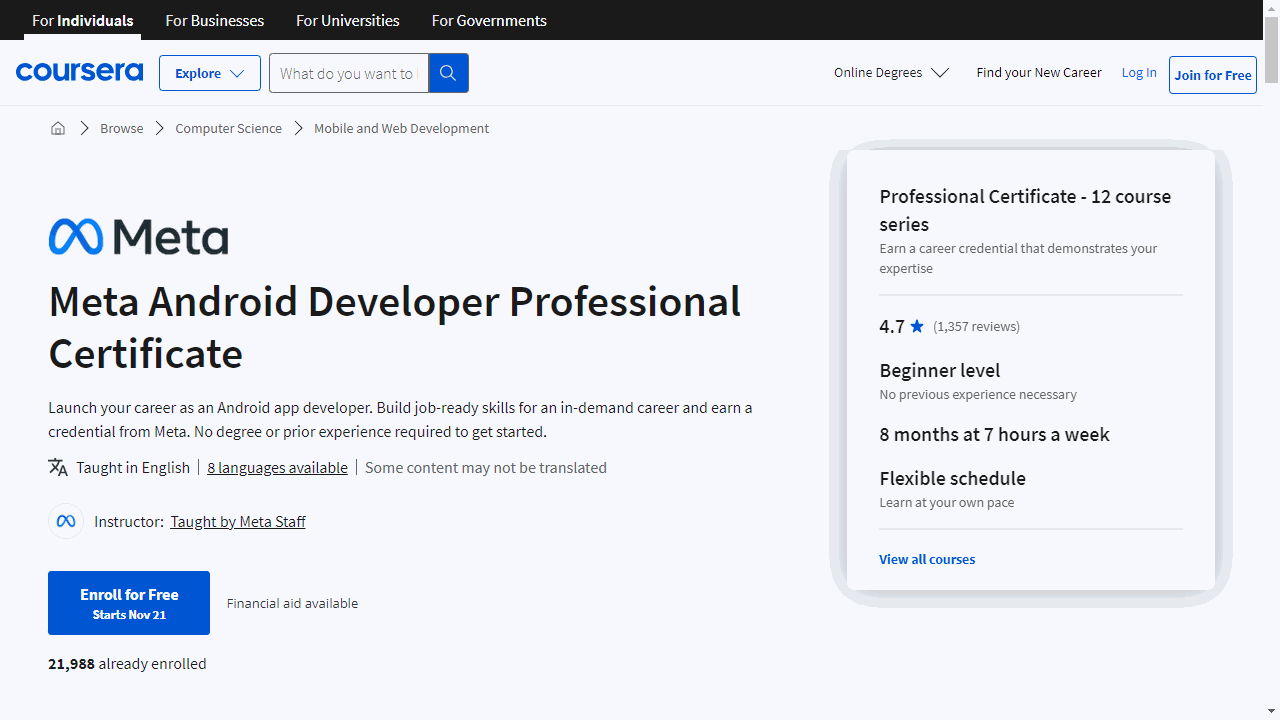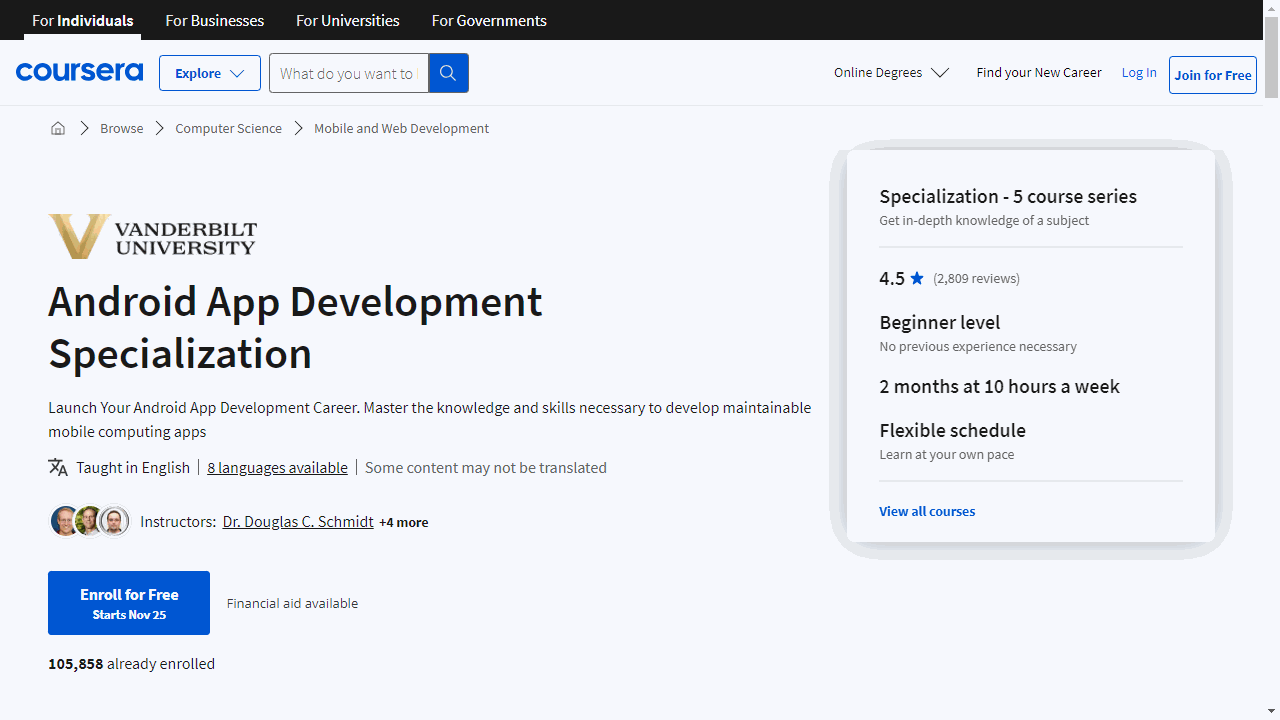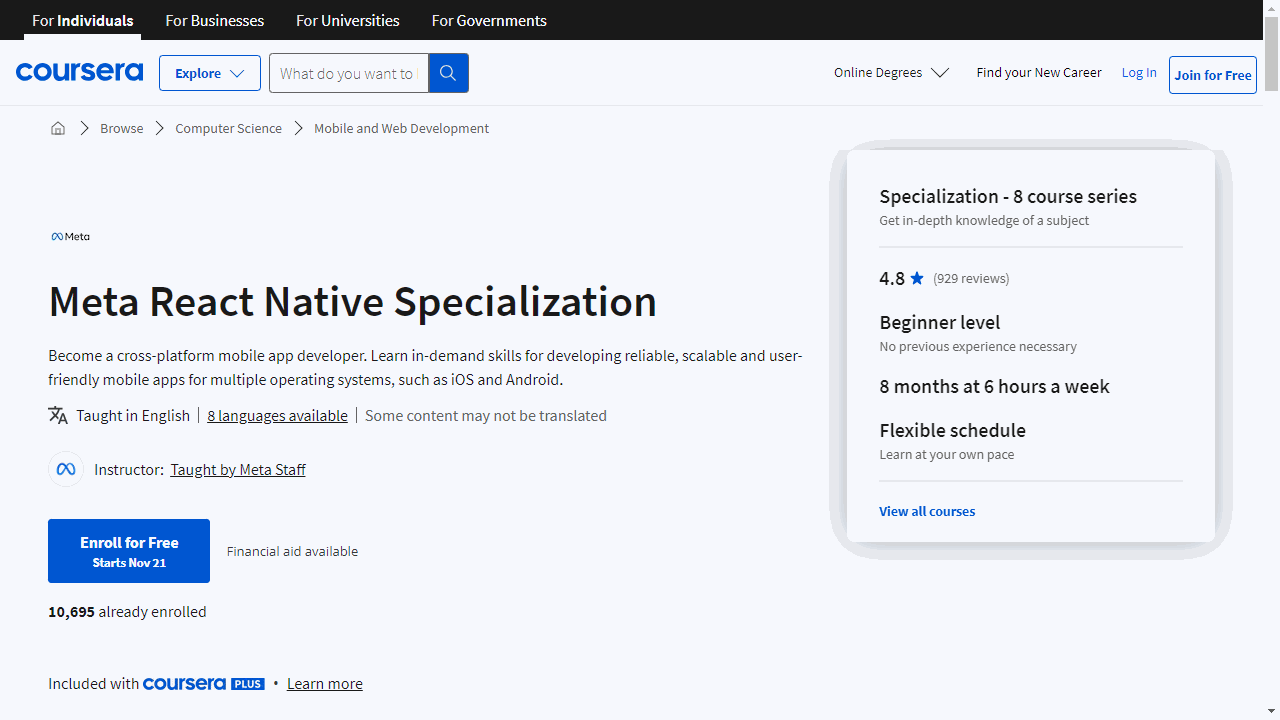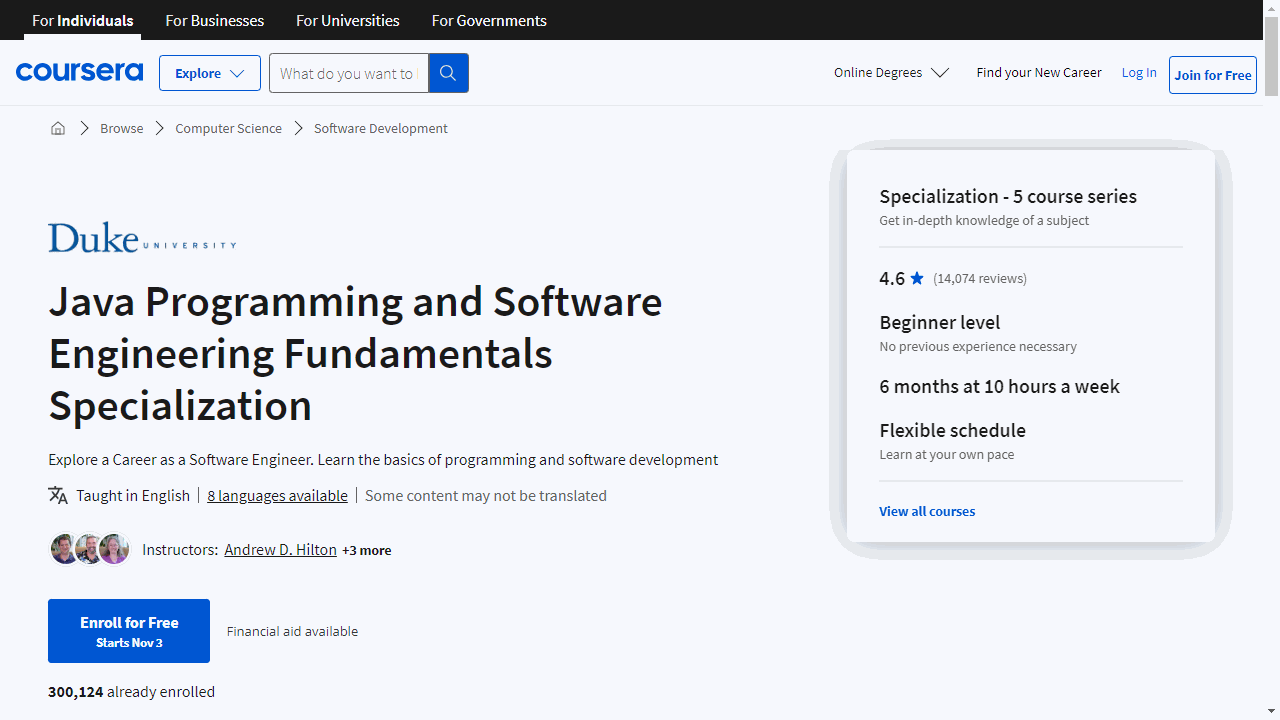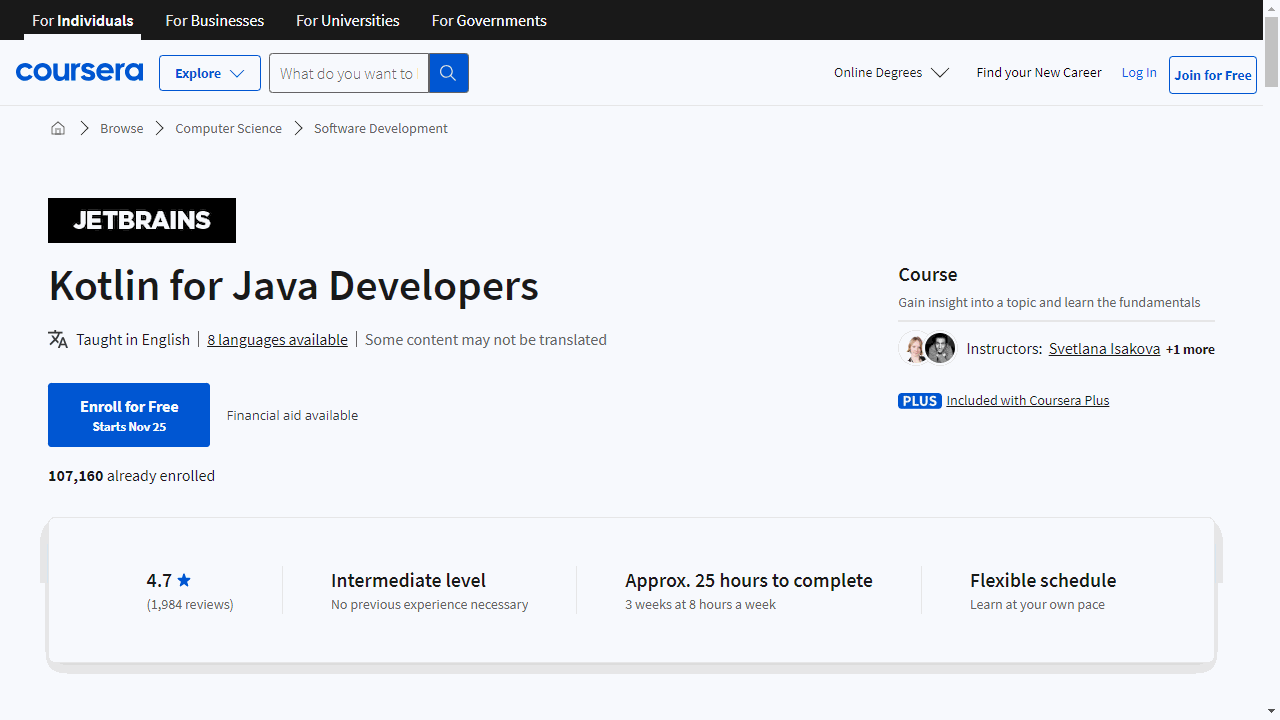Android app development is a highly sought-after skill, offering a path to creating innovative mobile applications used by millions worldwide.
Learning Android development opens doors to exciting opportunities, from freelance work to full-time positions at leading tech companies.
By mastering Android development, you can bring your ideas to life, build a portfolio of impressive apps, and even pursue a career in this dynamic industry.
Finding a good Android development course on Coursera can be tricky.
You want a program that’s comprehensive, engaging, and taught by experts, but also fits your learning style and goals.
For the best Android development course overall on Coursera, we recommend the Meta Android Developer Professional Certificate.
This program is an exceptional choice due to its thorough curriculum, covering everything from foundational concepts to advanced techniques.
The course combines lectures with hands-on projects, allowing you to build real-world applications and solidify your understanding.
It also emphasizes crucial skills like Git and GitHub, ensuring you’re prepared for collaborative development environments.
All this with the expertise developed by Meta, a mobile-focused company that knows what it takes to succeed in the industry.
This is just one outstanding option.
There are other great Android development courses on Coursera, offering a range of learning styles and specializations.
Keep reading to discover more recommendations, whether you’re a complete beginner or looking to refine your skills in specific areas of Android development.
Meta Android Developer Professional Certificate
The Meta Android Developer Professional Certificate on Coursera is a meticulously crafted program that equips you with the essential skills and practical experience to thrive in the mobile app development industry.
Begin with the “Introduction to Android Mobile Application Development” course, where you’ll familiarize yourself with Android Studio and Kotlin—the core tools for Android app creation.
This course doesn’t just introduce you to the basics; it sets you on a path to building your very first Android app.
As you progress, “Version Control” becomes crucial.
It’s not just about coding; it’s about collaborating effectively.
Learn to navigate Git and GitHub, essential tools for managing changes and working seamlessly with teams across the globe.
Deepen your programming knowledge with “Programming Fundamentals in Kotlin.”
Here, you’ll delve into the language’s nuances, from variables and loops to data structures.
The practical “Bank Account” project solidifies your understanding, bridging theory with real-world application.
No app can succeed without a thoughtful user experience.
“Principles of UX/UI Design” immerses you in the user’s world, teaching you to conduct research and translate findings into intuitive designs.
You’ll practice with Figma, moving from abstract concepts to tangible wireframes and prototypes.
Transitioning these designs into functional interfaces is where “Create the User Interface in Android Studio” comes in.
Android Studio, developed by Google and JetBrains, is the official IDE for Android.
You’ll explore Jetpack Compose and learn to craft user interfaces that are not only visually appealing but also adhere to best practices in usability.
For those ready to tackle more complex challenges, “Advanced Programming in Kotlin” introduces sophisticated programming concepts.
This course is about refining your skills, focusing on advanced object-oriented features and unit testing to ensure your apps are reliable and maintainable.
Data persistence and web communication are pivotal in modern apps, and “Working with Data in Android” covers these topics comprehensively.
You’ll get hands-on with SQLite and Kotlin coroutines, learning to manage data effectively and ensure your app’s longevity.
The program also recognizes the importance of cross-platform development.
“Mobile Development and JavaScript” lays the groundwork for using JavaScript and prepares you for React, a key library for building cross-platform applications.
Building on that, “React Basics” and “React Native” guide you through creating dynamic user interfaces and mobile apps with React.
These courses are practical, focusing on components, props, and state management within the React ecosystem.
The culmination of your learning is the “Android App Capstone,” where you apply everything you’ve learned to develop a comprehensive Android app.
This project is not just an academic exercise; it’s a portfolio piece that demonstrates your capabilities to future employers.
Lastly, “Coding Interview Preparation” ensures you’re not just a skilled developer but also a savvy interviewee.
You’ll learn effective communication, problem-solving techniques, and the computer science fundamentals that interviewers look for.
This program is designed to be comprehensive without being overwhelming.
It’s structured to provide a logical progression of skills, building on each previous course to solidify your understanding and prepare you for the next step.
Android App Development Specialization
The specialization kicks off with “Java for Android,” where you’ll master Java’s essential features and apply them to Android’s core components using Android Studio.
This course lays a solid foundation, enabling you to build apps with both robust functionality and intuitive interfaces.
As you progress to “Android App Components - Intents, Activities, and Broadcast Receivers,” you delve deeper into the Android framework.
You’ll learn to orchestrate various app components and manage data efficiently, all while getting hands-on experience with Git for version control.
The practical project involves creating an app that dynamically handles image data from the web, a skill that’s invaluable in the app development landscape.
In “Android App Components - Services, Local IPC, and Content Providers,” the focus shifts to the seamless operation of background tasks and data management.
You’ll piece together a stylish RSS reader app, integrating material design principles that not only ensure functionality but also enhance aesthetic appeal.
“Engineering Maintainable Android Apps” is where you’ll learn to future-proof your work.
The course emphasizes test-driven development, utilizing frameworks like JUnit and Robotium to maintain high-quality code.
It also introduces software patterns that promote clarity and extensibility in your app development process.
The culmination of this specialization is the “Capstone MOOC for ‘Android App Development,’” where you’ll synthesize your newfound knowledge by creating a unique app.
This final project is your opportunity to demonstrate your comprehensive understanding of Java programming, Android components, and testing methodologies.
With a commitment of just 10 hours per week, this specialization is designed to fit into your busy schedule, offering a hands-on, flexible learning experience.
Soon enough, you’ll find yourself ready to publish your own Android apps on the Google Play Store.
Meta React Native Specialization
This specialization is designed to equip you with the skills needed to thrive in the mobile app development space.
The journey begins with “Introduction to Mobile Development,” where you’ll get a clear picture of a mobile developer’s role.
You’ll start with the essentials, HTML and CSS, and quickly move on to the exciting realm of cross-platform apps with React Native.
This course sets a strong foundation, essential for what’s to come.
As you progress to “Programming with JavaScript,” you’ll delve deeper into the language that’s essential for web and mobile app interactivity.
You’ll tackle practical exercises that will solidify your understanding of JavaScript fundamentals, and you’ll learn how to test your code effectively using Jest, ensuring your applications run smoothly.
In “Version Control,” collaboration becomes the focus.
You’ll learn how to use Git and GitHub, tools that are indispensable for working in teams and managing code changes.
This course is crucial for understanding the workflows that keep large-scale projects organized and running efficiently.
“React Basics” is where you start building.
You’ll explore React’s component-based architecture, learning to create interfaces that update dynamically and respond to user input.
This course is about making your apps intuitive and engaging, a skill that’s highly valued in the industry.
With “React Native,” you’ll apply your React knowledge to mobile app development.
You’ll practice building components, managing state, and navigating between screens.
This course is key to understanding how to leverage React’s capabilities to create apps that feel native to both Android and iOS platforms.
“Working with Data” shifts your focus to the backend, teaching you how to handle data within your React Native applications.
You’ll learn about REST APIs, SQL, and data storage solutions like AsyncStorage and SQLite.
This course ensures your apps are not just visually appealing but also robust and data-driven.
The “Principles of UX/UI Design” course is where design meets function.
You’ll learn to create user-centric designs, understanding the importance of empathy in UX research and the practicalities of UI design with tools like Figma.
This course is about ensuring your apps are not only functional but also enjoyable to use.
Finally, the “Capstone (React App)” is where everything you’ve learned comes together.
You’ll take on a real-world project, applying your skills to build an app from the ground up.
This is your opportunity to create a portfolio piece that demonstrates your comprehensive understanding of mobile app development.
If you’re serious about becoming a mobile developer, this specialization is a great place to start.
Java Programming and Software Engineering Fundamentals Specialization
This comprehensive 5-course specialization provides you with a solid foundation in core programming concepts and Java skills.
Java is not as easy to learn as Python, but it’s a powerful language used by many top companies for building enterprise applications.
The first course starts with the basics, teaching you how to think like a programmer and solve problems using JavaScript, HTML and CSS. You’ll learn key building blocks like functions, loops and conditionals while creating an interactive image filter web page.
From there, the courses quickly level up your skills.
The Java Programming course teaches you how to build algorithms, debug code and write programs that manipulate images and data. By the end, you’ll have analyzed CSV files to determine baby name popularity.
The third course expands your abilities using arrays, lists and structured data. You’ll read and write data files, perform quantitative analyses and create complex programs using multiple Java classes.
Next, you’ll take on even bigger challenges involving software design principles and interfaces. You’ll write programs that sort earthquake data and generate predictive text.
Finally, you’ll put all your new skills to work by creating movie and book recommendation systems, just like Netflix and Amazon use.
This will not be the easiest specialization you can take when first starting out, but it will give you a solid foundation in Java and software engineering.
Kotlin for Java Developers
This course is tailored to build upon your Java expertise, easing you into Kotlin—the modern language of choice for Google’s Android—with a practical, hands-on approach.
Starting with an introduction to Kotlin, you’ll quickly grasp its significance and how it improves upon Java.
The course is structured to build your knowledge progressively, beginning with simple programs and advancing to complex concepts.
You’ll write your first “Hello, world” and swiftly move to tackle variables, functions, and control flow with conditionals and loops.
What sets this course apart is its emphasis on real-world application.
You’ll dive into extension functions, a standout feature in Kotlin, through the development of a Mastermind game.
This isn’t just passive learning; it’s active coding that cements your understanding.
Null safety, a cornerstone of Kotlin’s design, is covered comprehensively.
You’ll learn how to handle nullable types and implement safe casts, key to crafting stable Android applications.
The course also demystifies lambdas and collection operations with interactive quizzes, reinforcing your learning through practice.
As you delve into object-oriented programming in Kotlin, you’ll explore constructors, inheritance, and class modifiers.
The course doesn’t just teach you to write code; it teaches you to write good code—code that’s clean and maintainable.
Advanced topics like operator overloading and inline functions are introduced with clarity, showing you how to write efficient, powerful Kotlin code.
You’ll also compare collections and sequences, understanding when and how to use each for optimal performance.
The course culminates with the development of classic games like 2048 and Game of Fifteen, allowing you to apply your comprehensive Kotlin knowledge in a fun, engaging way.
